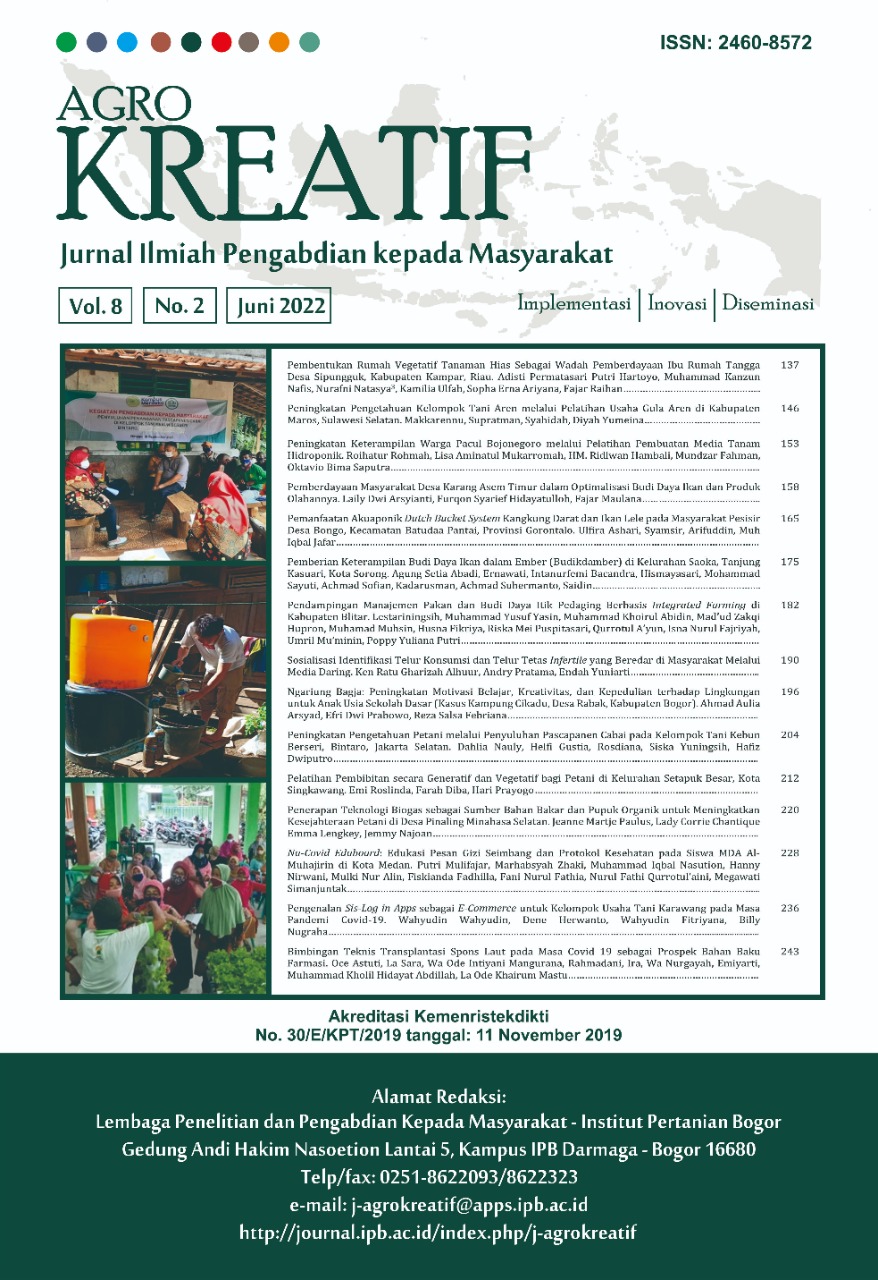Nu-Covid Eduboard: Edukasi Pesan Gizi Seimbang dan Protokol Kesehatan pada Siswa MDA Al-Muhajirin di Kota Medan
Abstract
The Covid-19 virus is a virus that spread quickly either directly or indirectly. Prevention of the Covid-19 virus can be accompanied by a strong immune system, namely by improving a healthy lifestyle with balanced nutritional foods. Nutrition education stands for an effort to increase knowledge of nutrition and eating behavior which is important for elementary school children. The media which common to use is a playing board that can help students to understand and recall what has been conveyed. Based on this reason, the Medan Kota 02 KKN-T group designed a program to increase understanding of nutrition to prevent Covid-19 among elementary students in MDA Al-Muhajirin, in Kota Matsum IV Village. The activity began by filling out a pre-test to find out student's knowledge before receiving education material. After that, continued with delivering nutrition and covid materials including an explanation of the balanced nutrition cone, then continued with the health protocol material, playing the board game by attaching food stickers to the picture of the balanced nutrition cone and matching the picture with the health protocol description. In the last session, all the students were asked to filling out the post-test. The impact of this program is that students understand and apply how to maintain healthy and balanced nutrition guidelines (PGS) and comply with prokes. The results indicated that the value of the participants from pre-test to post-test increased not too significantly, namely by 0.034, which could be caused by knowledge bias due to distraction. The distraction may be caused by the participants' unpreparedness in receiving the material, the class conditions that are not supportive, and the lack of initiative of the participants to take notes and understand the material provided. Nu-Covid eduboard may be an alternative program for increasing student knowledge about balanced nutrition guidelines and prokes in covid-19 pandemic situation.
Downloads
References
Audry CL, Putri MR, Jauhar ZM. 2021. Edukasi pencegahan Covid-19 melalui media sosial. Jurnal Pengabdian Kepada Masyarakat. 1(1):130‒139. https://doi.org/10.31002/abdipraja.v1i1.3145
Aunurrahman. 2014. Belajar dan Pembelajaran. Bandung (ID): Alfabeta.
Briawan D. 2016. Perubahan pengetahuan, sikap, dan praktik jajanan anak sekolah dasar peserta program edukasi pangan jajanan. Jurnal Gizi Pangan. 11(3): 201‒210.
Calder PC. 2021. Nutrition and immunity: lessons for Covid-19. European Journal of Clinical Nutrition. 11(1): 74‒92. https://doi.org/10.1038/s41387-021-00165-0
Chowdhury Ma, Hossan N, Kashem M, Shahid MA, Alam A. 2020. Immune Response in Covid-19: a Review. Journal of Infection and Public Health. 13(1):1619‒1629. https://doi.org/10.1016/j.jiph.2020.07.001
Hikmawati Z, Yasnani Y, Sya’ban AR. 2016. Pengaruh penyuluhan dengan media promosi puzzle gizi terhadap perilaku gizi seimbang pada siswa kelas V di SD Negeri 06 Poasia Kota Kendari tahun 2016. Jurnal Ilmiah Mahasiswa Kesehatan Masyarakat. 1(2):1‒9.
Ho M, Garnett SP, Baur L. 2012. Effectiveness of lifestyle interventions in child obesity: systematic review with meta-analysis. Pediatrics. 130(1): 1647‒1671. https://doi.org/10.1542/peds.2012-1176
[Kemenkes] Kementrian Kesehatan RI. 2014. Permenkes RI Nomor 41 tahun 2014 tentang Pedoman Gizi Seimbang.
Khotijah S, Trianto A, Utomo P. 2017. Penerapan model pemrosesan informasi pada pembelajaran membaca siswa di SMP Negeri 02 Bengkulu Utara. Jurnal Ilmiah Korpus. 1(2): 199‒209. https://doi.org/10.33369/jik.v1i2.4121
Palupi KC, Sa’pang M, Swasmilaksmita PD. 2018. Edukasi gizi seimbang pada anak Sekolah Dasar di Kecamatan Cilincing Jakarta Utara. Jurnal Abdimas. 5(1): 49‒53.
Perdana F, Madanijah S, Ekayanti I. 2017. Pengembangan media edukasi gizi berbasis android dan website serta pengaruhnya terhadap perilaku tentang gizi seimbang siswa sekolah dasar. Jurnal Gizi Pangan. 12(3): 169‒178. https://doi.org/10.25182/jgp.2017.12.3.169-178
Saputro AA, Saputra YD, Prasetyo GB. 2020. Analisis dampak Covid-19 terhadap kesadaran masyarakat dalam penerapan protokol kesehatan. Jurnal PORKES. 3(2): 81‒92. https://doi.org/10.29408/porkes.v3i2.2865
Setyani M, Ismah. 2018. Analisis tingkat konsentrasi belajar siswa dalam proses pembelajaran matematika ditinjau dari hasil belajar. Seminar Nasional Pendidikan Matematika. 1(1): 73‒84.
Titis B, Sari W. 2019. Pengaruh durasi belajar terhadap hasil belajar matematika siswa kelas 5 Ledok 006 Salatiga. Jurnal Review Pendidikan dan Pengajaran. 2(1): 139‒144. https://doi.org/10.31004/jrpp.v2i1.264
[WHO] World Health Organization. 2020. Transmisi SARS-CoV-2: Implikasi terhadap Kewaspadaan Pencegahan Infeksi.
Widiyatmoko A. 2012. Pengembangan Perangkat Pembelajan IPA Fisika Dengan Pendekatan Physics-Edutainment Berbantuan CD Interaktif. Journal of Primary Education. 1(1): 38‒44
This work is licensed under a Creative Commons Attribution-NonCommercial 4.0 International License.



















